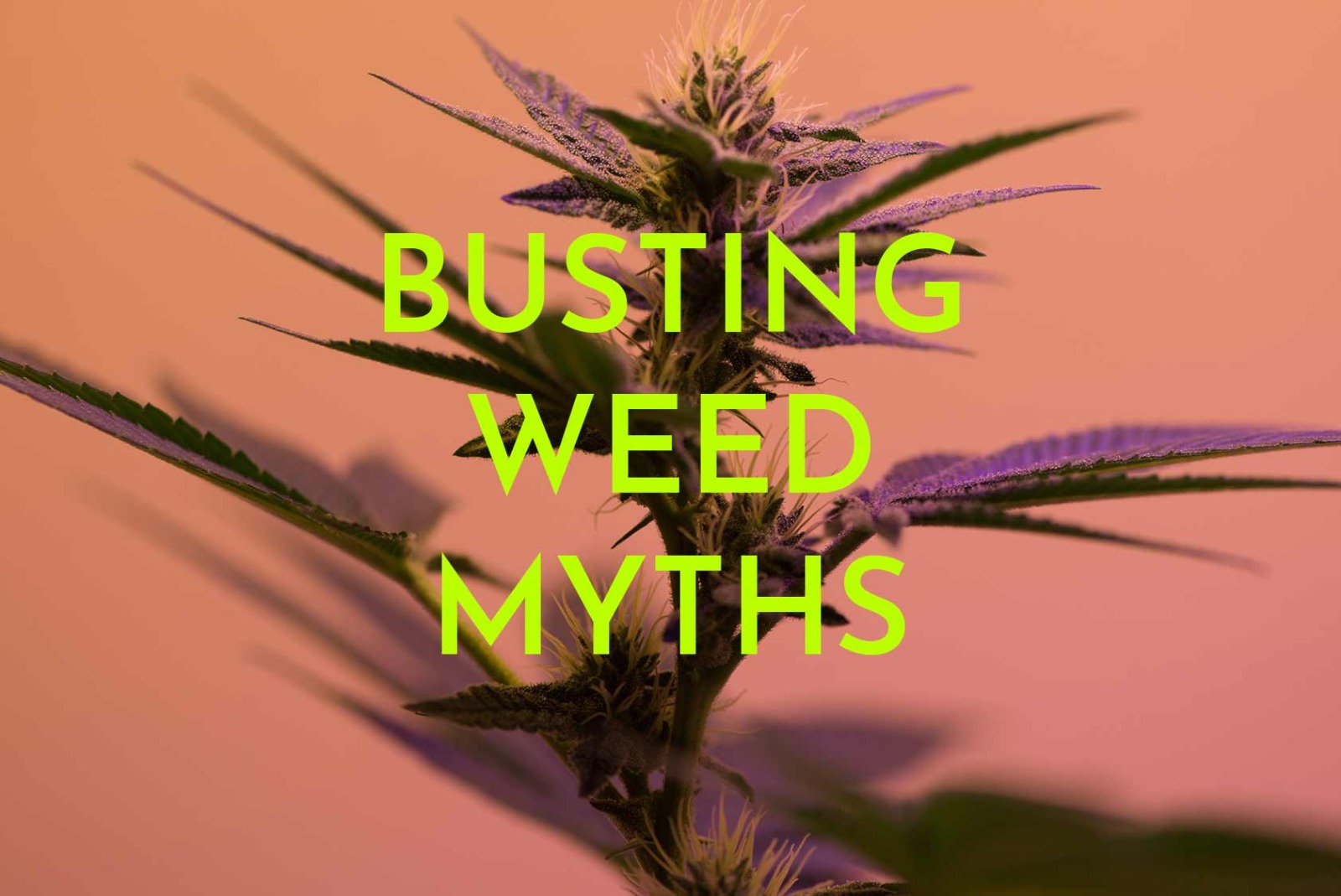Cannabis has a bad-boy reputation that we’d like to undo. We, too, feel somewhat out of it when it comes to some questions about cannabis. But we also think of ourselves as thought leaders in the industry and want to offer reassurance for all things weed. So, if you’re looking for confirmation or clarification on any common misconceptions, then you’ve come to the right place. In this article, we will answer five of the most popular weed myths.
Busting seven weed myths
1. Weed is legal in Jamaica and the Netherlands
Many people make stoner pilgrimages to Jamaica and the Netherlands as they are looked at as weed havens, safe from the persecution of less liberally minded nations. This perception is somewhat true, but neither of these countries have formally legalized Cannabis. Cannabis is only fully legal in Canada and Uruguay.
Jamaica relaxed their cannabis laws in 2015. If you’re caught with less than 56.6 grams (2 ounces) of cannabis without a prescription, you’ll get a slap on the wrist and a 500 Jamaican dollar fine—less than $5 US. Locals are allowed to grow up to five plants in their homes for personal use. That said, it’s easy to get legal weed in Jamaica with a prescription for anxiety, insomnia, or chronic pain, among other things. Supposedly, a note from a doctor in any state where legal medical marijuana is available will fly when you buy in Jamaica.
In the Netherlands, they have had an official policy since 1976 of not enforcing existing laws relating to the possession of small amounts of cannabis or the sale of cannabis in so-called coffee shops, of which there around 700. That said, there are also corner stores selling all kinds of edibles, bongs, and grinders. It’s something of a grey market that Canada resided in until 2018. But don’t go and sit outside a bar and try to spark up like the green boy I was at age 18. They’ll quickly tell you to put it out.
2. US prisons are overflowing with people convicted for possession of marijuana
In the US, around 40,000 inmates are in prison for marijuana-related crimes and roughly half of those are in for weed offences alone. The majority are involved in distribution, while less than 1% are in for possession alone. Still, even up to 400 people in prison for marijuana possession seems like 400 too many.
3. Can weed reduce my IQ?
We start with this question, as many seem to wonder what smoking does to your brain. It also seems that the question has turned into many studies, experimental tests and research papers. While the effects of weed make it harder to retain information and access it in the short term, there’s no indication that the drug has a lasting impact on cognitive abilities.
Although, such concern is relevant when it comes to parents worried about their teenagers. If your child starts consuming cannabis at a young age, it could stunt their brain development, meriting severe caution.
4. Can weed cure cancer?
No. Only minor aspects of most ailments can even consider marijuana as a reliever, never mind a cure. People are known to use weed to help deal with feelings of nausea & vomiting caused by chemotherapy. Others have reported that it helped with neuropathic pain or helped with food intake.
The best way to put it is that “relying on marijuana alone as treatment while avoiding or delaying conventional medical care for cancer can have serious health consequences.” So, can weed cure cancer? No. No, it cannot. It does have many therapeutic benefit which are still being discovered, such as aiding with addiction and weight loss.
5. Can weed kill me?
No. Weed alone is not poisonous or harmful in a way that can cause death. In most reported cases of ‘bad trips,’ people have felt anxious or agitated in their bodies due to an unmeasured use of weed. Overconsumption can induce fear while in a psychoactive mind state. The only way weed can kill you is if you’re caught dealing it in Brunei.
6. Does weed make me creative?
The better question perhaps is if it can free up some rigidities, which many have reported it does. Certain strains of weed are indeed chosen over others by many in search of creative thoughts. Sativa often has lower doses of CBD and higher amounts of THC. Sativa often produces a “mind high,” or an energizing, anxiety-reducing effect. If you use Sativa-dominant strains, you may feel productive and creative, not relaxed and lethargic.
7. Am I too old to try weed?
You’re never too old to try weed. The sooner you give it a go, the more you can learn why, when and what works for you. Or, why it doesn’t. Adapting and experimenting is what is almost uncannily true for alcohol, meditation and yoga too. So whether you are “too old” to try weed is a question you need to answer yourself, taking into account your comforts, tendencies and disposition. Starting late wouldn’t be what causes issues. Although, age can often lead to physical health issues that you should consider before trying weed.
While the answers to some “weed myths” vary from person to person, weed has enamoured enough people in its history. Many pioneering medical doctors have fought for its legitimacy, slowly changing public perception to the truth of its benefits.
Cannabis can be a friend or a foe, but that outcome depends on how you approach it. Suppose you’re looking to get out of a bad mood, trying a new strain, or looking to increase your tolerance. In that case, it could dampen the experience versus smoking in a safe, social setting, for example. If you’re new to cannabis, start by smoking as that’s easier to control your dosage and consider a single A strain.
Speaking of myths, how about the one that cannabis provides you with an edge in professional sports? see

